225. Squibb L. (1971), Estimating the metabolizable energy of foodstuffs with avian model, Journal of Nutrition, 101, pp. 1211-1216.
226. Stein H.H., Sève B., Fuller M.F., Moughan P.J., de Lange C.F.M. (2007), Invited review: Amino acid bioavailability and digestibility in pig feed ingredients: terminology and application, Journal of Animal Science, 85 (1), pp. 172-180.
227. Stevenson M.H. (2006), The nutritional value of cassava root meal in laying hen diets, Journal of the Science of Food and Agriculture, 35 (1), pp. 36-40.
228. Stott J.A., Smith H. (1966), Microbiological assay for protein quality with Tetrahymena pyriformis W. 4. Measurement of availabe lysine, methionine, arginine and histidine, British Journal of Nutrition, 20, pp. 663-673.
229. Tanksley T.D.Jr., Kanabe D.A., Purser K., Zebrowska T., Corley J.R. (1981), Apparent digestibility of amino acids and nitrogen in three cottonseed meals and one soybean meal, Journal of Animal Science, 52, pp. 769-777.
230. Taverner M.R., Hume I.D., Farrell D.J. (1981), Availability to pigs of amino acids in cereal grains. 1. Endogenous levels of amino acids in ileal digesta and faeces of pigs given cereal diets, British Journal of Nutrition, 46, pp. 149-158.
231. Terpstra K. (1978) Total and digestible amino acids. In Kan C.A., Simons,
P.C.M. (Eds.) Proceedings Second European Symposium on Poultry Nutrition.
Beekbergen, The Netherlands, pp. 97-101.
232. Thomas O.P., Crissey S.D. (1983), Recent advances in the field of amino acid bioavailability. In Larbier M. (Ed.) Proceedings Fourth European Symposium on Poultry Nutrition. Tours, France, pp. 82-90.
233. Titgemeyer E.C., Armendariz C.K., Bindel D.J., Greenwood R.H., Loest C.A. (2001), Evaluation of titanium dioxide as a digestibility marker in cattle, Journal of Animal Science, 79, pp. 1059–1063.
234. Titus H.W. (1955), The scientific feeding of chickens, The Interstate, Illinois.
235. Truc D.X. (2001), Poultry production in Vietnam has a bright future, World Poultry - Elsevier, 17 (2), pp. 32-33.
236. Tung D.X., Rasmussen S. (2005), Production function analysis for smallholder semi-subsistence and semi-commercial poultry production systems in three agro-ecological regions in northern provinces of Vietnam, Livestock Research for Rural Development, 17 (6).
237. Turner K.A., Applegate T.J., Lilburn M.S. (1999), Effects of feeding high carbohydrate of fat diets. 2. Apparent digestibility and apparent metabolizable energy of posthatch poult, Poultry Science, 78, pp. 1581-1587.
238. USDA (2011), EU 27 poultry and products annual: EU-27 poultry production and exports to grow again in 2011 and 2012, GAIN Report Number: FR9076.
239. USDA (2012), International egg and poultry review, September 04, 15 (36).
240. USDA (2013), Livestock and poultry: World markets and trade, April 2013.
241. van Leeuwen P., verstegen M.W.A, van Lonkhuijen H.J, van Kempen G.J.M (1991) Near infrared reflectance (NIR) spectroscopy to estimate the apparent ileal digestiblity of protein in feedstuff. In Vestegen M.W.A., Huisman J., den Hartzog (Eds.) Digestive physiology in pigs. Pudoc Wageningen, Pudoc, pp. 260-265.
242. Van Soest P.J. (1967), Development of a comprehensive system of feed analyses and its application to forages, Journal of Animal Science, 26, pp. 119-128.
243. Villamide M.J., Fuente J.M., Perez de Ayala P., Flores A. (1997), Energy evaluation of eight barley cultivars for poultry: Effect of dietary enzyme addition, Poultry Science, 76, pp. 834-840.
244. Villamide M.J., San Juan L.D. (1998), Effect of chemical composition of sunflower seed meal on its true metabolizable energy and amino acid digestibility, Poultry Science, 77, pp. 1884-1892.
245. Vogtmann H., Pfirter H.P., Prabucki A.L. (1975), A new method of determining metabolisability of energy and digestibility of fatty acids in broiler diets, British Poultry Science, 16 (5), pp. 531-534.
246. Vohra P. (1972), Evaluation of metabolizable energy for poultry, World’s Poultry Science Journal, 29, pp. 204-214.
247. Vohra P., Chami D.B., Oyawoye E.O. (1982), Determination of metabolizable energy by a fast method, Poultry Science, 61, pp. 766-769.
248. Vohra P., Kratzer F.H. (1967), Absorption of barium sulphate and chromic oxide from the chicken gastrointestinal tract, Poultry Science, 46, pp. 1603-1604.
249. Wang X., Parsons C.M. (1998), Dietary formulation with meat and bone meal on a total versus a digestible or bioavailable amino acid basis, Poultry Science, 77, pp. 1010-1015.
250. Wang X., Parsons C.M. (1998), Effect of raw material source, procesing system, and processing temperatures on amino acid digestibility of meat and bone meals, Poultry Science, 77, pp. 834-841.
251. Wang Z., Cerrate S., Cotto C., Yan F., Waldroup P.W. (2007), Utilization of distillers dried grains with solubles (DDGS) in broiler diet using a standard mutrient matrix, International Journal of Poultry Science, 6, pp. 470-477.
252. Webb K.E. (1990), Intestinal absorption of protein hydrolysis products: A review, Journal of Animal Science, 68, pp. 3011-3022.
253. Whitson D., Carrick C.W., Roberts R.E., Haughe S.M. (1943), Utilization of fat by chickens – A method of determining the absorption of nutrients, Poultry Science, 22, pp. 137-141.
254. Yamazaki M. (1983), A comparison of two methods in determining amino acid availability of feed ingredients, Japanese Journal of Zootechnical Science, 4, pp. 729-733.
255. Yoshida M., Morimoto H. (1970), Effect of restriction of feed or energy supply on the responses of the growing chicks, Agricultural and Biological Chemistry, 34 (5), pp. 692-699.
256. Zarei A. (2006), Apparent and true metabolizable energy in artemia meal,
International Journal of Poultry Science, 5 (7), pp. 627-628.
257. Zonta M.C.M., Rodrigues P.B., Zonta A., de Freitas R.T.F., Bertechini A.G., Fialho E.T., Pereira C.R. (2004), Energia metabolizável de ingredientes protéicos determinada pelo método de coleta total e por equações de predição, Ciênc. agrotec., Lavras, 28 (6), pp. 1400-1407.
144
PHỤ LỤC
PHỤ LỤC 1
145
GIÁ TRỊ DINH DƯỠNG CỦA CÁC KHẨU PHẦN (THÍ NGHIỆM 3)
Khẩu phần | Thành phần dinh dưỡng (%DM) | |||||||
DM | CP | EE | Ash | CF | NDF | AIA | ||
Thí nghiệm năm 2009 | ||||||||
1 | KPCS | 86,38 | 23,59 | 4,92 | 6,91 | 3,14 | 12,70 | 2,10 |
2 | KPCS + ngô lai 1 | 87,71 | 16,44 | 4,40 | 5,42 | 3,82 | 13,36 | 1,80 |
3 | KPCS + cám gạo | 93,29 | 18,81 | 9,32 | 7,56 | 3,94 | 14,07 | 2,06 |
4 | KPCS + bột sắn KM94 - 1 | 87,88 | 18,48 | 3,38 | 6,32 | 3,73 | 13,43 | 2,04 |
5 | KPCS + đậu tương ép đùn | 87,93 | 26,21 | 8,69 | 7,12 | 3,81 | 13,19 | 1,91 |
6 | KPCS + bột cá cơm | 88,27 | 33,62 | 4,68 | 8,71 | 3,18 | 10,99 | 1,97 |
7 | KPCS + khô dầu đậu tương | 87,10 | 27,89 | 5,56 | 6,36 | 3,89 | 15,32 | 2,17 |
Thí nghiệm năm 2010 | ||||||||
8 | KPCS | 88,74 | 23,20 | 3,49 | 6,82 | 3,78 | 9,12 | 2,02 |
9 | KPCS + bột đầu tôm | 89,78 | 29,48 | 4,26 | 10,20 | 5,51 | 13,11 | 2,12 |
10 | KPCS + khô dầu lạc | 89,12 | 28,56 | 4,88 | 6,89 | 4,48 | 10,03 | 1,97 |
11 | KPCS + tấm gạo | 89,44 | 17,99 | 2,91 | 5,22 | 2,51 | 8,16 | 1,81 |
Thí nghiệm năm 2011 | ||||||||
12 | KPCS | 89,07 | 22,38 | 3,49 | 6,80 | 3,30 | 26,60 | 2,01 |
13 | KPCS + gạo lứt | 88,13 | 17,57 | 3,53 | 5,21 | 2,51 | 20,86 | 1,78 |
14 | KPCS + bột thịt xương | 88,10 | 28,75 | 2,96 | 14,16 | 2,79 | 26,01 | 2,06 |
Thí nghiệm năm 2012 | ||||||||
15 | KPCS | 87,91 | 22,31 | 4,13 | 7,05 | 3,91 | 26,94 | 2,02 |
16 | KPCS + DDGS1 | 88,10 | 23,73 | 4,32 | 6,86 | 4,68 | 30,03 | 1,84 |
17 | KPCS + khô dầu hạt cải | 87,64 | 26,86 | 3,46 | 7,74 | 5,74 | 28,32 | 2,12 |
18 | KPCS + bột lông vũ | 87,91 | 37,47 | 4,33 | 6,91 | 2,80 | 33,61 | 1,99 |
19 | KPCS + đậu tương thủy phân | 88,10 | 29,02 | 3,57 | 7,82 | 3,90 | 23,97 | 2,10 |
Có thể bạn quan tâm!
-
 Xác định giá trị năng lượng trao đổi có hiệu chỉnh nitơ men, tỉ lệ tiêu hóa hồi tràng các chất dinh dưỡng của một số loại thức ăn và ứng dụng trong thiết lập khẩu phần nuôi gà thịt - 17
Xác định giá trị năng lượng trao đổi có hiệu chỉnh nitơ men, tỉ lệ tiêu hóa hồi tràng các chất dinh dưỡng của một số loại thức ăn và ứng dụng trong thiết lập khẩu phần nuôi gà thịt - 17 -
 Xác định giá trị năng lượng trao đổi có hiệu chỉnh nitơ men, tỉ lệ tiêu hóa hồi tràng các chất dinh dưỡng của một số loại thức ăn và ứng dụng trong thiết lập khẩu phần nuôi gà thịt - 18
Xác định giá trị năng lượng trao đổi có hiệu chỉnh nitơ men, tỉ lệ tiêu hóa hồi tràng các chất dinh dưỡng của một số loại thức ăn và ứng dụng trong thiết lập khẩu phần nuôi gà thịt - 18 -
 Xác định giá trị năng lượng trao đổi có hiệu chỉnh nitơ men, tỉ lệ tiêu hóa hồi tràng các chất dinh dưỡng của một số loại thức ăn và ứng dụng trong thiết lập khẩu phần nuôi gà thịt - 19
Xác định giá trị năng lượng trao đổi có hiệu chỉnh nitơ men, tỉ lệ tiêu hóa hồi tràng các chất dinh dưỡng của một số loại thức ăn và ứng dụng trong thiết lập khẩu phần nuôi gà thịt - 19
Xem toàn bộ 166 trang tài liệu này.
146
Khẩu phần | Thành phần dinh dưỡng (%DM) | |||||||
DM | CP | EE | Ash | CF | NDF | AIA | ||
Thí nghiệm năm 2013 | ||||||||
20 | KPCS | 87,91 | 22,31 | 4,13 | 7,05 | 3,91 | 26,94 | 2,02 |
21 | KPCS + khô dầu dừa | 87,64 | 21,92 | 5,77 | 7,37 | 6,13 | 32,32 | 2,33 |
22 | KPCS + cám gạo sấy | 88,39 | 19,44 | 9,83 | 12,12 | 4,47 | 24,00 | 6,04 |
23 | KPCS + cám gạo trích ly | 88,57 | 21,82 | 2,59 | 10,66 | 10,49 | 40,04 | 3,82 |
24 | KPCS + DDGS2 | 89,46 | 24,24 | 4,90 | 6,97 | 5,02 | 30,33 | 1,98 |
25 | KPCS + bột gia cầm thủy phân | 87,64 | 32,10 | 6,13 | 7,40 | 2,99 | 21,68 | 2,30 |
PHỤ LỤC 2
MỘT SỐ HÌNH ẢNH TRONG QUÁ TRÌNH THÍ NGHIỆM
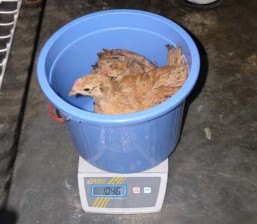
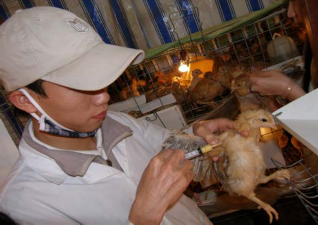
Hình 1. Cân gà thí nghiệm Hình 2. Tiêm vaccine cho gà
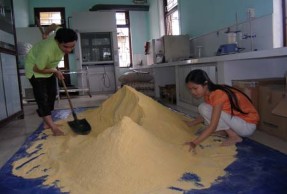
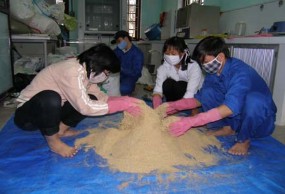
Hình 3. Đồng hóa thức ănHình 4. Trộn khẩu phần
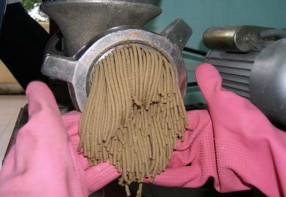
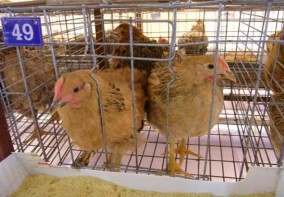
147
Hình 5. Ép viên thức ăn Hình 6. Gà Lương Phượng thí nghiệm
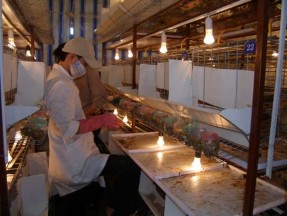
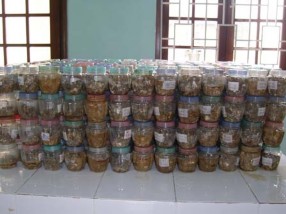
Hình 7. Thu mẫu chất thải Hình 8. Rã đông mẫu chất thải
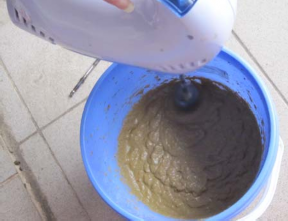
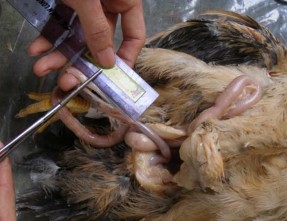
Hình 9. Đồng hóa mẫu chất thải Hình 10. Mổ gà thu dịch hồi tràng
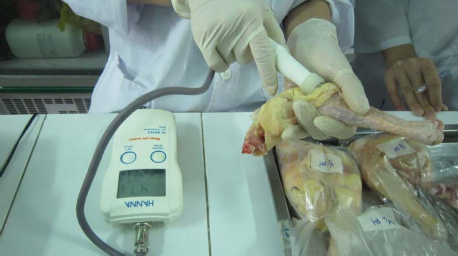
148
Hình 11. Đo pH thịt



